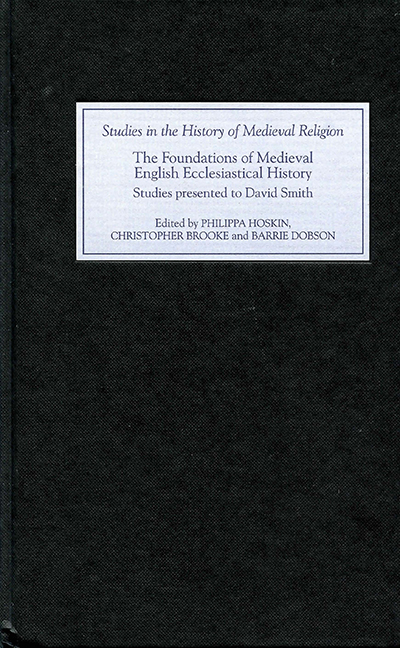Book contents
- Frontmatter
- Contents
- List of Contributors
- Acknowledgements
- Abbreviations
- Miscellaneous Frontmatter
- David Smith: the Scholar
- ‘The archivist is not and ought not to be a historian.’ David Smith and the Borthwick Institute
- Why Forge Episcopal Acta? Preliminary Observations on the Forged Charters in the English Episcopal Acta Series
- Pastors and Masters: the Beneficed Clergy of North-East Lincolnshire, 1290–1340
- The Convent and the Community: Cause Papers as a Source for Monastic History
- Patriarchy and Patrimony: Investing in the Medieval College
- ‘Above all these Charity’: the Career of Walter Suffield, Bishop of Norwich, 1244–57
- The Law of Charity and the English Ecclesiastical Courts
- Continuing Service: the Episcopal Households of Thirteenth-Century Durham
- The Acta of English Rural Deans in the later Twelfth and early Thirteenth Centuries
- The Court of Arches and the Bishop of Salisbury
- Bishops’ Registers and Political History: a Neglected Resource
- The Vatican Archives, the Papal Registers and Great Britain and Ireland: the Foundations of Historical Research
- Bibliography of the Writings of David Smith
- Index
- Tabula Gratulatoria
Why Forge Episcopal Acta? Preliminary Observations on the Forged Charters in the English Episcopal Acta Series
Published online by Cambridge University Press: 24 October 2017
- Frontmatter
- Contents
- List of Contributors
- Acknowledgements
- Abbreviations
- Miscellaneous Frontmatter
- David Smith: the Scholar
- ‘The archivist is not and ought not to be a historian.’ David Smith and the Borthwick Institute
- Why Forge Episcopal Acta? Preliminary Observations on the Forged Charters in the English Episcopal Acta Series
- Pastors and Masters: the Beneficed Clergy of North-East Lincolnshire, 1290–1340
- The Convent and the Community: Cause Papers as a Source for Monastic History
- Patriarchy and Patrimony: Investing in the Medieval College
- ‘Above all these Charity’: the Career of Walter Suffield, Bishop of Norwich, 1244–57
- The Law of Charity and the English Ecclesiastical Courts
- Continuing Service: the Episcopal Households of Thirteenth-Century Durham
- The Acta of English Rural Deans in the later Twelfth and early Thirteenth Centuries
- The Court of Arches and the Bishop of Salisbury
- Bishops’ Registers and Political History: a Neglected Resource
- The Vatican Archives, the Papal Registers and Great Britain and Ireland: the Foundations of Historical Research
- Bibliography of the Writings of David Smith
- Index
- Tabula Gratulatoria
Summary
‘In the eleventh and twelfth centuries social pressures were such that respectable men and respectable communities forged as they had not forged before and would never forge again.’ In England, particularly, where the shock of the Norman Conquest had made religious institutions fear that they might lose knowledge of their past and thus control of their possessions, the first half of the twelfth century was, as is well known, a period when the past was reinvented. Closely linked with that process was the forging of charters. However, the practice of forgery had by no means died away in the later twelfth or the thirteenth centuries. We should therefore expect to find examples of forgeries among the thousands of charters assembled in the English Episcopal Acta series, and, indeed, such is the case: out of over six thousand episcopal acta collected in the series, and in the volumes of acta of Archbishop Stephen Langton, the twelfth-century bishops of Chichester and the early twelfth-century bishops of Durham published earlier on in other record series, over 110 documents appear to be forgeries, and question marks hang over another 40 at least. In arriving at these totals I have concentrated, for reasons of time and space, on those items marked out as spurious or possibly so by the series editors, and although I have identified some further items as suspect, the list provided here must be regarded as provisional only, the more so since work on this paper has been done while the series was only about two-thirds complete. The English Episcopal Acta volumes available to me at the time of writing were 1–30, which means that no consideration could be paid, inter alia, to any of the acta of bishops of Rochester or to those of bishops of Worcester from the Conquest up to the thirteenth century. The cathedral priories of these sees were notorious for forging all sorts of documents and are likely to have been among the most active forgers of episcopal acta.
Information
- Type
- Chapter
- Information
- The Foundations of Medieval English Ecclesiastical HistoryStudies Presented to David Smith, pp. 18 - 39Publisher: Boydell & BrewerPrint publication year: 2005
